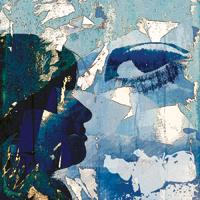 |
| "Crying Woman" from http://www.kazuya-akimoto.com/ |
On Dec 21, 2010, a case of two young girls being assaulted and gang-raped was reported. Two girls were returning from a party in DHA Karachi, when a white car rammed into their car.
They were then taken to an apartment. Both the girls were tortured. Whereas only the younger one, said to be twenty plus and a model, was raped. According to newspaper reports, the girls were acquainted with the alleged rapists during the party and perhaps got into a quarrel with them there. The culprits have been blackmailing the girls on cell phone, ever since the FIR was registered, according to reports.
This is not the first time such a case has been reported. However, two very unfortunate unethical developments followed this offence. Firstly, the name, address and personal details of the rape victim were published in two English dailies. She eventually had to disappear for safety and withdraw the FIR.
According to newspaper reports, advisor to Sindh chief minister, Sharmila Farooqui, accompanied the electronic media to the hospital where the victim was being treated. The victim, who was also being blackmailed on phone and under emotional strain, refused to talk to Farooqui, the reports say. But Farooqui, reportedly, went on camera, giving all the details of the victim, calling her "hyper" and "rude".
"Basically the stigma and discrimination that follow these incidents make the situation much worse," says human rights activist Zia Awan, who works mainly in Karachi. Asked about the legal provisions for assault victims that protect their identities and personal details, Awan tells TNS, "There have been cases when the victims sued newspapers, especially tabloids, for blackmailing. Few cases were won but the victims have to undergo a discriminatory and crude system to win these cases."
There are many social dimensions to this case. The fact that the victim belongs to a social stratum which is liberal and doesn’t follow many social norms played negatively for her, especially in the media.
"There have been rumours and cell phone messages about a car that hits cars driven by women, abducts and rape them," says Sara Zaman Director of an NGO called War Against Rape in Karachi. However, she adds that in posh localities like DHA people seldom report cases. "This serves as an incentive for culprits. There is definitely some truth behind these tales because similar cases have been reported many times."
With the advent of electronic media, the victims of sexual violence face an additional threat. Most of the victims don’t get FIRs registered because they fear their identity will be released. And this case was an example. Moreover, channels have been showing photographs of victims, some of them deceased, naming their relatives, village and house address and details of the case. This is not only insensitive but also unethical. Some shows re-construct the whole event to give the viewers a true flavour of the incident. These stories are sensational and sell well but are of a little help in the social reality we exist in. They leave little room for the victim or her family to return to the society.
 Rapists are normally caught for robbery or murder, but not for rape because either the victims back out or else there is no substantial evidence.
Rapists are normally caught for robbery or murder, but not for rape because either the victims back out or else there is no substantial evidence.
"I must quote here the case of a five-year-old girl in Khizri," says Zia Awan. "The offender was sentenced within three months of the incident. This is an incredible success story because the parents fully co-operated with us and were involved in the case since the very start while the medical evidence was also fresh."
The electronic media needs to quit its jumpstart policy when covering rape stories, the politicians should refrain from being opinion mavericks and police should avoid passing a judgement before time. Otherwise, the victims will continue to suffer and criminals will continue to harass women.
This piece was first published in The News in January 2011.
No comments:
Post a Comment